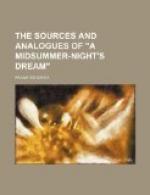Now a duke name Pirithous came to visit his friend Theseus; who being also a friend to Arcite begged Theseus to let him go free out of prison, which Theseus did. And Arcite was set free without ransom, but on condition that his life should be forfeit if he ever set foot again in any domain of Duke Theseus.
Yet now Arcite found himself in no better stead, being banished from the sight of his lady; and could even find it in his heart to envy Palamon, who might still blissfully abide in prison—nay, not in prison, in Paradise, where sometimes he might see her whom both loved. And on his part Palamon was jealous of Arcite, who might even now be calling together his kin in Thebes to make onslaught on Athens and win his lady Emilia.
“Yow loveres axe I now this questioun,
Who hath the worse, Arcite or Palamoun?”
Now when Arcite had for a year or two endured this torment, he dreamed one night that the god Mercury appeared to him, and said to him, “To Athens shalt thou wend.” Whereupon Arcite started up, and saw in the mirror that his sufferings had so changed him that he might live in Athens unknown. So he clad himself as a labourer, and went with one squire to Athens, and offered his service at the court, where for a year or two he was page of the chamber to Emilia, and passed under the name of Philostrate. And in the course of time he was so honoured that Theseus took notice of him, and made him squire of his own chamber, and maintained him nobly.
Meantime Palamon had lain seven years in prison, when it befel on the third day of May (as the old books that tell this story say) that, aided by a friend, he broke prison, having given his gaoler to drink of drugged wine, and so fled the city, and lay hid in a grove. Hither by chance came Arcite to do observance to May; and first Palamon heard him sing
“Wel-come be thou, faire fresshe
May;
I hope that I som grene gete may,”
and thereafter fall into a study, as lovers will, lamenting his hard fate that he should be passing under a false name, and daily be slain by the eyes of Emilia. Whereat Palamon started up, and reproached him, and challenged him to fight; and Arcite answered him no less boldly, saying he would bring him arms and weapons on the morrow, as well as meat and drink and bedding for the night.
So on the morrow the two donned their harness, helping each other to arm, and then fell a-fighting, Palamon like a wild lion, and Arcite like a cruel tiger, till they were ankle-deep in blood.
On the same day rode forth Theseus with Hippolyta and Emilia to hunt the hart, and Theseus was aware of the two knights fighting. He spurred his steed between them, and cried to them to hold their hands. And Palamon told him who they were, and why they fought. Theseus at first was angry, and condemned them both to death; but when the queen Hippolyta and Emilia and the ladies of their train pleaded for them, he relented,




